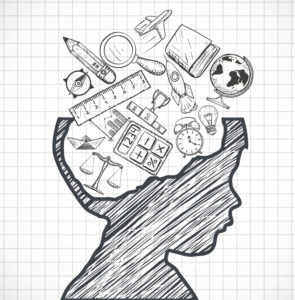Language matters. The words you choose to use to talk to yourself have a profound impact on your beliefs and actions. Words spoken out loud have the power to shape thoughts, beliefs, and public discourse. They also have the power to perpetuate stereotypes or put the light of day on discrimination.
“It’s my OCD” is one of the least favorite things I hear people say. For people living with Obsessive Compulsive Disorder, daily life can be an excruciating challenge. An extraordinary amount of personal energy can be expended to push back intrusive thoughts, and stave off the compulsive, ritualistic behaviors. The thoughts are not intentional, they are often not logical, they are not controllable, and they cause significant distress. To make matters even more exasperating, people with OCD are often very aware that their thoughts are not rational, and yet they are undeniably afraid. Having thoughts that you did not plan on having, thoughts that are appalling to you, that you do not want to think, brings about an intense loss of control. The lack of control, coupled with fear from the intrusive thought, drive a need to do something to regain control, and this is a perfect breeding ground for compulsivity. The behavior lessens the panic, and it is often the only thing that will initially bring about the much-needed sense of relief. However, the intrusion and anxiety return, and thus the behavior must be repeated. As the intrusive thoughts persist and breed, the behaviors continue and expand, and the association between relief and compulsions grows stronger.  I have seen people’s lives shrink to fractions of what they once were due to the hours on hours spent enslaved to ritualistic and compulsive behavior. I have seen families fractured because the illness holds a loved one captive, and forbids
I have seen people’s lives shrink to fractions of what they once were due to the hours on hours spent enslaved to ritualistic and compulsive behavior. I have seen families fractured because the illness holds a loved one captive, and forbids
them from touching, hugging, kissing their own child, sibling, or spouse. I have watched kids lose friends, drop activities, and live in absolute shame often terrified to allow their parents in to their thoughts for fear that they will be unlovable. I have been witness to the excruciating pain and embarrassment that people feel as they watch their lives fall apart at the end of their own behavior. I have heard the number of times individuals have tested others, shared even the most minuscule detail of their anxiety as a test of others, only to hear ‘don’t worry’, a confirmatory piece of evidence to remind them of how ridiculous their behavior is. So, when I hear anyone flippantly state that ‘their’ OCD is making them clean, with a chortle, I cringe. Not only does it make light of a serious mental wellness issue, these statements also kind of make fun of people facing OCD.
OCD is not the only one that is thrown around. Attention Deficit Hyperactivity Disorder (ADHD) is another common ground for misguided fodder. ADHD is a serious neurological condition that can have a significant impact on a person’s ability to regulate their attention, focus, organization, and overall consistency in life. ADHD is not laziness, and it is extremely frustrating for people with the condition. People who have ADHD often miss social cues, make comments they didn’t mean to make (or would not have made if they had a chance to stop the thought, and find it excruciating to try and hold their attention on something that is not of high interest. Once something is enticing enough to cue the attention centers of their brains to focus, it then becomes extremely hard for them to stop focusing.

In reality, ADHD is about a significant impairment in the regulation of attention, so the common misperception that a kid who can play guitar for hours because they love it is therefore only choosing not to focus on school, is wrong. And it is damaging. The people I have worked with who are diagnosed with ADHD often carry a sense of shame about it. At our core, most of us want to belong and being different is not generally embraced. And that is what is so hard to see because ADHD also brings with it creativity, energy, an ability to multi-task that far exceeds most. It is also associated with high intelligence and a wonderful ability to approach problems from a unique perspective. However, it takes a long time for people to see ADHD as a possible strength, and it takes even longer to undue the negative stereotypes perpetuated by flippant remarks. I was at a junior high school function last year where one teacher started goofing off and acting obviously over the top as he gave out awards to the students, the principal of the school replied, “time to wrap up, his ADHD meds are wearing off”. My heart sank. I actually had to hold back tears because I know all too well that the gymnasium was populated by many beautiful teens and parents who have to deal with the reality of ADHD every day. Even writing this makes me feel upset.
You can’t see mental health. You have no idea what the person next to you has overcome and what people in ear shot of your remarks have had to face. We’ve grown-up a lot as a society. I hope that we have all progressed from jokes about mental retardation, sexual orientation, and equality. Let’s challenge ourselves to do better. Try saying, “I like a clean table” when you stack dishes for the server in place of “it’s my OCD”. Try “I don’t know why I said that” instead of “I’m so ADHD”. Try asking someone about ADHD if they tell you they have it. Think about remarking “I heard that people with ADHD are known creativity and giftedness”, or “wow, I can’t believe how many projects you have on the go, I can’t switch my focus like that!” Don’t minimize anxiety by telling an anxious person “it’s going to be fine” or “stop worrying”; believe me if it were an option they would have. Try instead to ask, “how can I help” or “what do you need from me”? It’s a small shift, which to me means that it is manageable and likely repeatable. Change the way we talk, and it will change the way we think. Softly and gently we can change.
“Water is fluid, soft, and yielding. But water will wear away rock, which is rigid and cannot yield. As a rule, whatever is fluid, soft, and yielding will overcome whatever is rigid and hard” Lao Tzu
Carmen Dodsworth, BSc., MA.
Registered Psychologist



 I can already say that I’ve seen a few surprises in how I spend my time and have become quite convinced that nothing good comes from the amount of news I read. It is actually kind of ironic that I do it, because I generally loathe talking about the news and often tell clients of mine to be careful of how they interact with news stories. Still, I am just keeping track and raising my own awareness of where I actually am before I make knee-jerk changes that tend to be fleeting. In addition to media use, I am noticing habits in my daily life, people I interact most with, and am becoming aware again of things I spend inordinate amounts of time thinking about. All of this by just tracking myself for a couple of weeks. It is not too late to start if you want to make meaningful changes in 2018….
I can already say that I’ve seen a few surprises in how I spend my time and have become quite convinced that nothing good comes from the amount of news I read. It is actually kind of ironic that I do it, because I generally loathe talking about the news and often tell clients of mine to be careful of how they interact with news stories. Still, I am just keeping track and raising my own awareness of where I actually am before I make knee-jerk changes that tend to be fleeting. In addition to media use, I am noticing habits in my daily life, people I interact most with, and am becoming aware again of things I spend inordinate amounts of time thinking about. All of this by just tracking myself for a couple of weeks. It is not too late to start if you want to make meaningful changes in 2018…. The kicker is that when my community and belonging needs are satiated, as they were over the holiday or in the summer when we have an endless roster of guests gathering with us for long lazy days, then my commitment and resolve for the gym vaporizes
The kicker is that when my community and belonging needs are satiated, as they were over the holiday or in the summer when we have an endless roster of guests gathering with us for long lazy days, then my commitment and resolve for the gym vaporizes reflection… There are a few different ways, and yes, the time tracking that we are already doing will help, but one of my favorite ways is to stop and think about your “Personal Highs”.
reflection… There are a few different ways, and yes, the time tracking that we are already doing will help, but one of my favorite ways is to stop and think about your “Personal Highs”. I am happy when I am on the side of a mountain because I constantly think to myself how wild it is that I am on the side of a mountain with no real certainty what will happen next. The why helps me define my value.
I am happy when I am on the side of a mountain because I constantly think to myself how wild it is that I am on the side of a mountain with no real certainty what will happen next. The why helps me define my value.

















